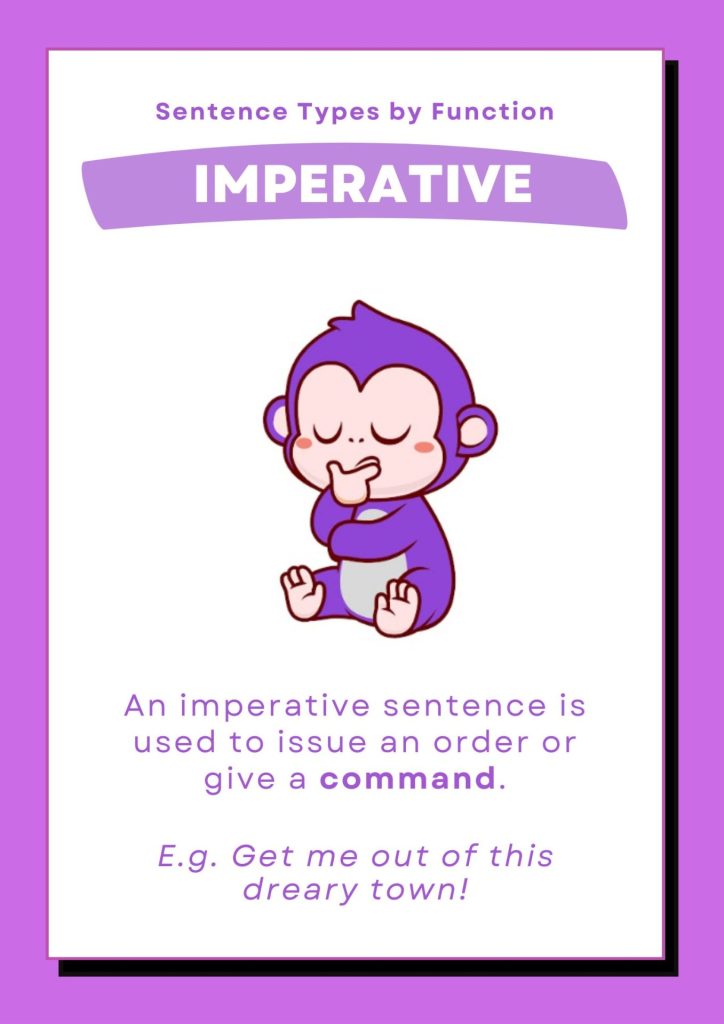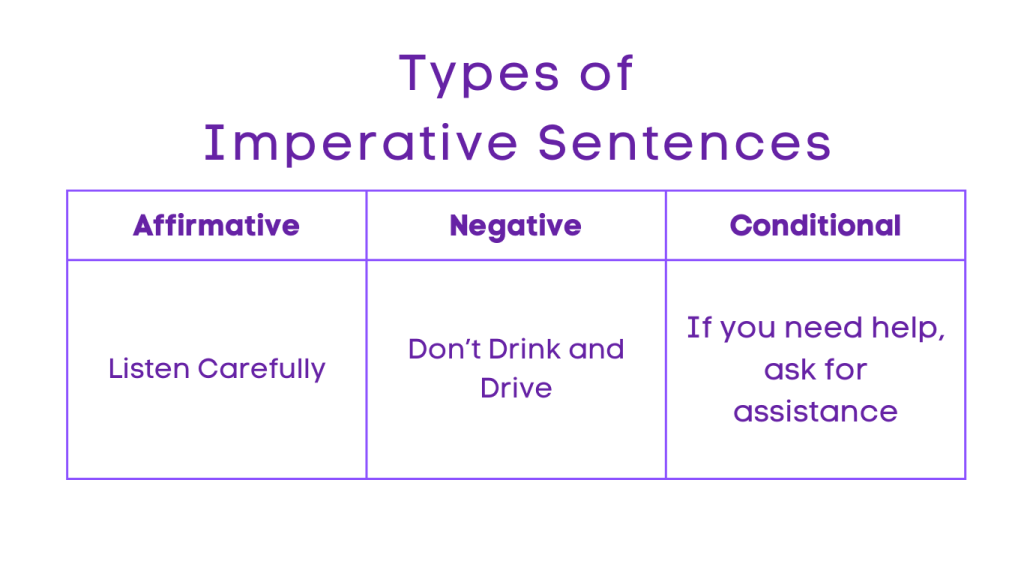Imperative Sentences – Meaning, Types and Examples
Table of Contents
Introduction
Imperative Sentences
Imperative sentences are a one of the fundamental types of sentences, serving as a means to issue commands, make requests, or express directives. They play a vital role in interpersonal communication, guiding and influencing the actions of others. Imperative sentences are characterized by their directness and assertiveness, often omitting the subject pronoun “you,” as it is implied. This omission adds to their succinctness and urgency, conveying the message with clarity and efficiency.
These sentences are used to prompt immediate action or compliance. Whether commanding someone to perform a task, making a request for assistance, or providing guidance on a particular course of action, imperative sentences cut straight to the point. Their straightforward nature makes them effective tools for communication in various contexts.
Imperative sentences can convey positive commands or requests, encouraging action or compliance in a constructive manner. They can also be employed to prohibit or discourage certain actions, asserting a directive by negating a specific behavior or activity.
Additionally, imperative sentences may introduce conditions under which the action should be carried out. These conditional directives offer guidance or instructions contingent upon specific circumstances or situations, ensuring that actions are taken appropriately based on the context.
In everyday communication, imperative sentences are indispensable tools for facilitating cooperation, issuing instructions, and influencing behavior. They guide individuals towards desired outcomes while maintaining clarity and assertiveness in their communication style.
Analogy of Definition
What are Imperative Sentences?
Imperative sentences are a type of sentence that gives a command, makes a request, or expresses a directive. They can be affirmative or negative and are often used to instruct or guide someone to perform a specific action.

Method
Structure of Imperative Sentences
The structure of an imperative sentence typically consists of a base verb or a verb phrase, with the subject “you” implied. In affirmative sentences, the base verb is used, while in negative sentences, the base verb is preceded by “do not” or “don’t.” Conditional imperative sentences may include “if” clauses to express a condition for the command or request.
Affirmative Imperative Sentences
Affirmative imperative sentences are used to give direct commands or instructions. They are formed using the base form of the verb, and the subject “you” is implied. For example, “Close the door,” “Please pass the salt,” and “Listen carefully.”
Negative Imperative Sentences
Negative imperative sentences are used to express commands or requests in a negative form. They are formed by adding “do not” or “don’t” before the base form of the verb. For example, “Don’t touch the hot stove,” “Do not enter without permission,” and “Don’t forget to turn off the lights.”
Conditional Imperative Sentences
Conditional imperative sentences include “if” clauses to express a condition for the command or request. They are used to convey a directive based on a specific condition. For example, “If you see him, tell him to call me,” “If it rains, bring an umbrella,” and “If you need help, ask for assistance.”

Examples
1. Affirmative Imperative Sentences
- Clean your room before dinner.
- Please remember to water the plants every morning.
- Share your ideas during the team meeting.
- Have a fantastic day ahead!
- Take a deep breath and relax.
2. Negative Imperative Sentences
- Don’t forget to lock the door when you leave.
- Don’t forget to turn off the lights before you leave.
- Don’t hesitate to ask for help if you need it.
- Never give up on your dreams.
- Avoid procrastinating and start working on your assignment now.
3. Conditional Imperative Sentences
- If you finish your homework, you can go outside to play.
- If you see any suspicious activity, report it immediately.
- Should you encounter any difficulties, don’t hesitate to contact our support team.
- In case of emergency, follow the evacuation procedures outlined on the wall.
- Should you need assistance, feel free to reach out to me.
Quiz
Tips and Tricks
1. Be Direct
Tip: Imperative sentences are commands or requests, so be clear and direct with your language.
2.Use Strong Verbs
Tip: Choose strong, action-oriented verbs to convey your message effectively. These verbs drive the action in the sentence.
3.Use Punctuation
Tip: End imperative sentences with a period (.) for commands and requests. Use an exclamation mark (!) sparingly for urgent or emphatic commands.
4.Avoid Ambiguity
Tip: Be clear and specific in your instructions to avoid confusion or misinterpretation.
Real life application
Story: “The Imperative Journey of Sarah and Mark”
Sarah and Mark embarked on a journey that led them to various real-life situations where imperative sentences played a crucial role in guiding their actions and interactions.
Scenario 1: The Travel Adventure
During their travel adventure, Sarah and Mark encountered a sign that read, “______ your seatbelt at all times.” The imperative sentence provided a clear directive for ensuring their safety while driving.
Scenario 2: The Culinary Experience
In a cooking class, the chef instructed the participants, “______ the onions before adding them to the pan.” The affirmative imperative sentence guided the students in preparing the ingredients for the recipe.
Scenario 3: The Safety Protocol
While visiting a construction site, Sarah and Mark were reminded to “______ the hard hat before entering the area.” The imperative sentence emphasized the importance of following safety protocols.
FAQ's
Like? Share it with your friends

